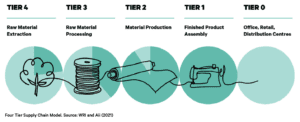Textile Processing Guide: Pretreatment, Colouration and Finishing
Introduction
The impact of today’s fashion industry has far reaching environmental consequences. And while raw material production and end of use may spring to mind, the processing stage of the supply chain, including pre-treatment, colouration (dyeing and printing) and finishing, is often overlooked as a critical area for pivotal and positive change.
This guide, based on industry and Fashion for Good research, is designed to provide an overview and deeper understanding of the processing stage, including innovative technologies that would help drastically reduce the water, energy and chemistry used, as well as replacing hazardous chemistry currently used1. A definition of all the key terms highlighted in teal can be found on page 32.
The textile industry’s supply chain is commonly represented in four Tiers, this is used to describe the production process from raw material extraction to the finished product. Tier 4 includes the cultivation and extraction of raw materials from the earth, plants or animals. Tier 3, the processing of raw materials into yarn and other intermediate products. The processing stage, discussed in this report, falls into Tier 2, which is often referred to as material production. Tier 1 is the assembly and manufacturing of the final products2.
Tiers 3 and 4 are often cited as the main cause of the fashion industry’s high environmental impact but actually make up only 39% of all greenhouse gas (GHG) emissions in the fashion supply chain. Whilst Tier 2 equates to 52% of the GHG emissions, and requires a significant amount of chemistry and water3.

As a result, there is ample opportunity to reduce impact in this stage of the supply chain. Fashion for Good works with brands, manufacturers and innovators to orchestrate collaborative projects and pilots aimed at accelerating innovation and implementation. The D(R)YE Factory of the Future, consortium project for example, was launched and orchestrated by Fashion for Good together with partners adidas, Kering, PVH Corp., Arvind Limited, and Welspun India and several innovators in textile pre-treatment, colouration and finishing. The project brings together several novel technologies with the aim of disrupting the current processing of textiles in the fashion supply chain.
